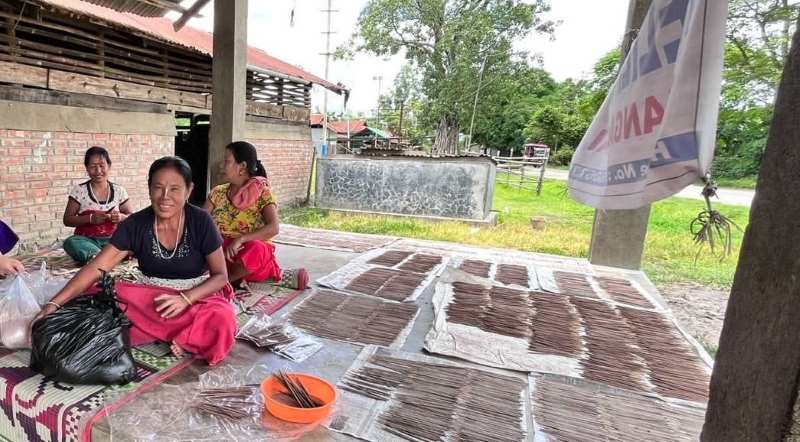As the conflict between the Meitei and Kuki communities in Manipur refuses to die down even after over two months, and with no hope of a solution in the near future, the plight of internally displaced people taking shelter at relief camps set up in several districts across the state is growing by the day.
In the wake of prolonged unrest causing a crisis situation for all in the state, livelihood of most people, particularly of the displaced people in relief camps, has been severely affected.
With no place to return to even after two months of being displaced, any means of livelihood seems like a far-fetched dream amid the continuing unrest situation in the state. However, amid the despair, a helping hand provides a ray of hope for the displaced.
Recent reports indicate that a staggering number of 52,599 internally displaced persons have sought refuge in relief camps across the state since the series of riots and violence broke out in the state.
The relief camps are scattered in various districts. Altogether, as many as 31 relief centres have been set up in Imphal West, 35 in Imphal East, 10 in Thoubal, 35 in Kakching, 53 in Bishnupur, 50 in Kangpokpi, one in Senapati, four in Jiribam, 15 in Ukhrul, six in Kamjong, seven in Tengnoupal, and 107 in Churachandpur, as per a data made available to the Imphal Free Press.
In an effort to address this dire situation and support the displaced victims, the Eta: Northeast Women's Network has taken the initiative to provide skill training programmes for the inmates, particularly women, at various relief camps in the valley districts.
Additionally, the organisation has been supplying raw materials to the relief camps, as a part of the initiative. These skill training programmes includes activities such as pickle-making, agarbatti production, and cream-ball making for selling in the market.
In a positive development, goods produced by displaced inmates from at least five relief camps, namely the Kakching Youth Hostel Relief Camp, Thangalawai Relief Camp, Wangkhei Relief Camp, Ngangkhalawai Relief Camp, and the Sinusiphai Relief Camp, have entered the market today.

Approximately, 70 inmates from these camps have already started earning through Eta's livelihood initiative.
During a recent visit by a media team, the inmates expressed their gratitude towards Eta for this empowering initiative and shared their delight in being able to earn while residing in the relief camps.
An inmate, who had recently started selling her products, highlighted the hardships they faced in the past two months and continue to face owing to lack of several essentials and facilities.
She said, though they were provided free meals, they were unable to purchase baby food for their children, including infants, and other essential items.
They were left jobless and unable to seek financial assistance from anyone. However, with Eta's intervention, they have now found a source of income and can afford the essential items, further said.
In addition to the skill development programme, Eta has been distributing mosquito nets, baby food, and other essential materials for daily use in the 18 relief camps they have visited since the crisis began.
The organisation plans to expand its skill training programmes to different relief camps, aiming to provide basic earnings for those staying in the relief camps.
As the state continues to grapple with the ongoing crisis, the efforts of organizations like Eta: Northeast Women's Network are crucial in empowering and supporting the displaced individuals, particularly women, by equipping them with skills and livelihood opportunities to sustain themselves during this challenging period.
The series of communal violence that broke out between the Meitei and Kuki communities on May 3-4 and the unfolding of events at several places in the state over the past two months have resulted in the displacement of over 60,000 people so far.
Read More: Dangerous road conditions pose serious risk in Tousem